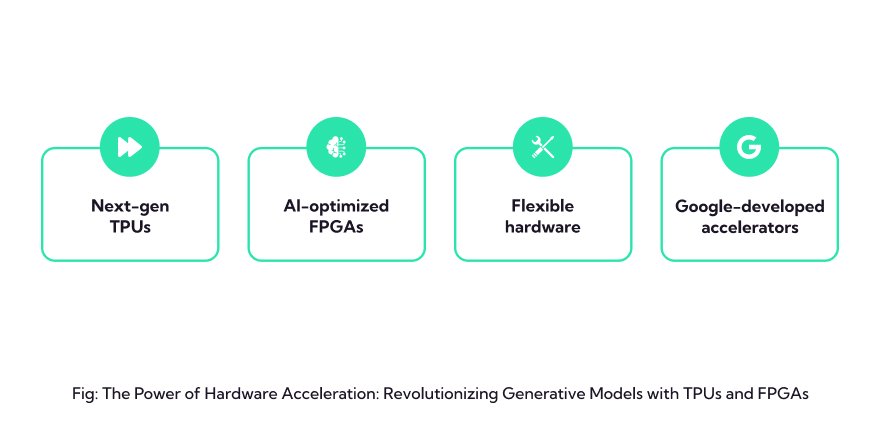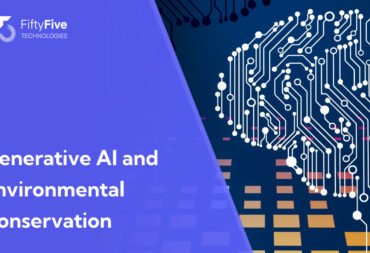Offices: Gurgaon, Jaipur, Indore, London, Dubai, Sweden
The Power of Hardware Acceleration: Revolutionizing Generative Models with TPUs and FPGAs

Welcome to the cutting-edge world of hardware acceleration! This is where technology meets innovation to push the boundaries of what’s possible, especially in the realm of generative models. From specialized accelerators like TPUs (Tensor Processing Units) to FPGAs (Field-Programmable Gate Arrays), the landscape of machine learning and AI is rapidly evolving. Let’s explore recent developments in hardware acceleration for training and inference of generative models, and how FiftyFive Tech is pioneering these advancements.
Understanding Hardware Acceleration
Hardware acceleration refers to the use of specialized hardware to perform certain computing tasks more efficiently than a general-purpose CPU. In the context of generative models, which include neural networks that create new data, such as images, text, or music, hardware acceleration is crucial. These models require significant computational power for both training (learning from data) and inference (making predictions).
The Rise of TPUs
Tensor Processing Units (TPUs), developed by Google, are specialized accelerators designed specifically for machine learning tasks. Unlike traditional CPUs and GPUs, TPUs are optimized for the high throughput required in deep learning.
Key Advantages of TPUs:
1. Performance
TPUs offer high performance for both training and inference of deep learning models. They are designed to handle the matrix operations that are fundamental to neural networks more efficiently than general-purpose processors.
2. Scalability
TPUs can be scaled across large data centers, enabling the training of very large models on vast datasets. This is particularly important for generative models that require massive amounts of data to learn effectively.
3. Energy Efficiency
TPUs are designed to be more energy-efficient compared to traditional GPUs, which is crucial for reducing the environmental impact of large-scale AI training.
The Versatility of FPGAs
Field-Programmable Gate Arrays (FPGAs) are another type of specialized hardware that offers unique advantages for machine learning.
Key Advantages of FPGAs
1. Customizability
Unlike fixed-function processors, FPGAs can be reconfigured to optimize for specific tasks. This flexibility allows them to be tailored for different phases of AI workloads, from data preprocessing to inference.
2. Parallelism
FPGAs excel at parallel processing, which can significantly speed up the execution of machine learning algorithms. This makes them particularly useful for real-time inference applications.
3. Latency
FPGAs can achieve very low latency, which is critical for applications that require immediate responses, such as autonomous driving or real-time video analytics.
Recent Developments in Hardware Acceleration
The field of hardware acceleration is rapidly advancing, with several noteworthy developments:
1. Next-Gen TPUs
Google continues to innovate with its TPU line, introducing the TPU v4, which boasts significant performance improvements over previous generations. These TPUs are capable of exascale computing, allowing for the training of models with trillions of parameters.
2. AI-Optimized FPGAs
Companies like Xilinx (now part of AMD) are developing FPGAs specifically optimized for AI workloads. The Xilinx Versal AI Core series, for example, integrates AI engines that deliver high throughput and low latency for machine learning tasks.
3. Hybrid Systems
There is a growing trend towards hybrid systems that combine the strengths of TPUs, FPGAs, and traditional GPUs. These systems can dynamically allocate workloads to the most appropriate hardware, maximizing efficiency and performance.

FiftyFive Tech’s Role in Advancing Hardware Acceleration
FiftyFive Tech is at the forefront of harnessing the power of hardware acceleration to drive innovation in generative models. Here’s how they’re making an impact:
1. Custom Solutions
FiftyFive Tech develops custom hardware acceleration solutions tailored to specific generative model applications. By leveraging both TPUs and FPGAs, they create systems that optimize performance and efficiency.
2. Research and Development
FiftyFive Tech invests heavily in R&D to stay ahead of the curve. Their dedicated team of engineers and researchers is constantly exploring new ways to improve the capabilities of TPUs and FPGAs, ensuring their clients benefit from the latest technological advancements.
3. Collaborations
FiftyFive Tech collaborates with leading hardware manufacturers and academic institutions to push the boundaries of what’s possible in hardware acceleration. These partnerships enable them to integrate cutting-edge innovations into their solutions.
4. Energy Efficiency Initiatives
Recognizing the environmental impact of large-scale AI training, FiftyFive Tech focuses on developing energy-efficient solutions. Their work with TPUs and FPGAs aims to reduce power consumption without compromising on performance.
The Future of Hardware Acceleration
The future of hardware acceleration in AI and generative models looks incredibly promising. As TPUs and FPGAs continue to evolve, we can expect to see even more powerful and efficient systems that will enable breakthroughs in AI research and applications.
1. AI at the Edge
With advancements in FPGAs, deploying AI at the edge (closer to where data is generated) will become more feasible. This can lead to faster decision-making processes in applications like IoT and autonomous systems.
2. More Accessible AI
As the cost of hardware accelerators decreases and their performance increases, AI and machine learning will become more accessible to smaller companies and individual developers, democratizing the field.
3. Enhanced Generative Models
The improvements in hardware acceleration will enable the development of more sophisticated generative models, leading to higher-quality and more realistic outputs in fields like entertainment, design, and content creation.
Hardware acceleration is a game-changer for training and inference of generative models, and the advancements in TPUs and FPGAs are paving the way for a new era of AI. With companies like FiftyFive Tech leading the charge, we’re witnessing unprecedented levels of performance and efficiency, making the future of AI more exciting than ever. Whether you’re a tech enthusiast, a researcher, or a business looking to leverage AI, the innovations in hardware acceleration are something to watch closely. The future is fast, efficient, and incredibly bright!
Contact sales, now.
Recent Posts
Wish to live a culture beyond tech ?
Quick links
Contact
-
INDIA
-
-
-
37B - Thinkvalley , Sector 32 - Gurgaon Haryana - 122002
-
J-2, Jhalana Institutional Area, Jhalana Doongri, Jaipur, Rajasthan 302004
-
Incuspaze Co-Work, 208, 2nd Floor, Apollo Premier, Vijaynagar Square, Indore (MP) 452010
Locations
-
UK
-
-
-
Wework, 33 Queen Street, London, England, EC4R 1AP
-
FZCO IFZA Business Park, Dubai Digital Park, Dubai Silicon Oasis, Dubai, United Arab Emirates
-
Herrgardsvagen 12 A 135 53 TYRESO Sweden
© All Copyright 2022 by FIFTYFIVE TECHNOLOGIES


